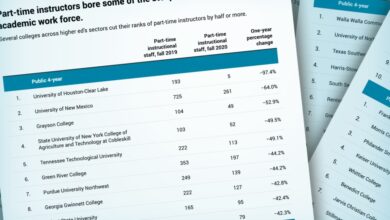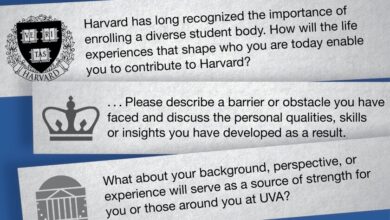Tenure Without Teeth

[ad_1]
Smolen-Morton is president of the South Carolina Conference of the American Association of University Professors. He’s also a birder. That January day, he went to the Horry County Solid Waste Authority in pursuit of the rarely seen slaty-backed gull. A friend had just spotted one at the same location.
At the dump, Smolen-Morton met another enthusiast, a recently retired mathematics professor from New York. They chit-chatted. Smolen-Morton mentioned that it was a good time to retire, considering, well, everything.
Like what? the math professor wondered. So the president expounded: about a bill pending in the South Carolina legislature that seeks to eventually do away with tenure; about recent changes in post-tenure review at Georgia public colleges; about legislative attempts to stymie instruction on critical race theory, among other topics. He could’ve gone on: about Covid-induced layoffs and budget cuts, or about the ever-shrinking proportion of tenured and tenure-track faculty members. Generally speaking, the professoriate has seen better days.
The math professor was alarmed, says Smolen-Morton. The scholar had been in something of a bubble during his four decades in the profession. During the conversation, the professor expressed what Smolen-Morton says is a common oversimplification of tenure, even among tenured faculty members: that its sole purpose is job protection, a way to reward a scholar with a position for life.
Smolen-Morton’s understanding of tenure — which aligns with the AAUP’s oft-cited “1940 Statement of Principles on Academic Freedom and Tenure” — is more expansive. (Though he didn’t say as much to the retired professor. If he had, the scholar would, “through the reek of the garbage, smell my lecture,” Smolen-Morton jokes.) According to that statement, yes, tenure is meant to provide for “a sufficient degree of economic security to make the profession attractive.” But tenure is also a means to achieve “freedom of teaching and research and of extramural activities.” Combine those ingredients — freedom and economic security — and tenure becomes “indispensable to the success of an institution in fulfilling its obligations to its students and to society.” It’s the pillar on which everything rests, so the thinking goes.
That pillar is at risk of crumbling. Tenure is facing intensifying pressure from the outside and from within.
Today, discussions about tenure bring to mind that 1970s Miller Lite beer commercial: ‘Tastes Great. Less Filling.’
The institution has become a punching bag for some conservative lawmakers. They see it as a tradition that has allowed liberalism to proliferate unchecked.
At the same time, tenure is being reconsidered even by faculty members. Reasons abound, some scholars argue, for razing or reconfiguring it. It exacerbates inequalities between the few who make it to the promised land and the many more who don’t. It’s a secretive process that has historically impeded women and scholars of color. And it can shield those who mistreat their students or colleagues from meaningful consequences.
Even before Covid-19, tenure’s reach was already limited. But financial troubles have further chipped away at it. “Today, discussions about tenure bring to mind that 1970s Miller Lite beer commercial,” the higher-ed scholar John R. Thelin wrote last year in The Review: “Tastes Great. Less Filling.”
Little by little, tenure is being redefined. Will it continue to wither away or morph into a new shape?
The South Carolina state representative, a Republican, filed for the 2022 legislative session the “Cancelling Professor Tenure Act.” If enacted, it would bar the award of tenure to professors, or any employees, hired by the state’s public colleges after December 31, 2022. No new employment contract after that date could be longer than five years. Eventually, existing tenure systems would cease “when there are no faculty members covered by the system who remain employed by the institution,” the bill says.
Similar bills have circulated in a few statehouses in recent years. The animating political philosophy behind them is that tenure can turn professorships into sinecures. Taylor, who did not respond to two voice-mail messages, told The Chronicle this past fall that he wants to replace the “lifelong guarantee” of permanent employment with something that resembles other sectors of the American economy.
Lawmakers also argue that tenure makes it more difficult to ensure faculty productivity. “Deadwood” professors can hang around for years, they say, with little incentive to produce research or improve their teaching. And tenure has led to a professoriate dominated by liberals who run amok in various ways.
Taylor’s bill seems to tackle both concerns. It would require all full-time or tenured faculty members to teach at least two undergraduate or graduate courses per semester, except for those in departments or schools that offer only graduate degrees. The supposed political bent of faculty members is also a major factor for Taylor. National surveys show that the vast majority of university professors are liberal, he wrote in a Facebook post promoting his bill.

Mark Harris for The Chronicle, photos from Alamy and Getty Images
“They give new meaning to students’ ‘liberal’ education,” the lawmaker wrote. “How about TERM LIMITS for professors? Tenure leads to lifelong bulletproof jobs.”
Defenders of tenure see Taylor’s bill as a direct threat to their work. Without it, a biology professor “may fear being fired for teaching about evolution … a sociology teacher for leading an honest classroom conversation about any topic — such as race, religion, or gender — that might offend someone,” the AAUP said in a statement.
The bill would “severely limit” the state of South Carolina’s ability to hire top researchers and administrators, says Carol E. Harrison, president of the University of South Carolina at Columbia’s AAUP chapter. Without tenure at Winthrop University, in Rock Hill, S.C., “I don’t think people would be interested in coming to the university, to be quite honest with you,” says Jennifer Jordan, faculty conference chair. “I don’t see what the incentive would be for them.”
Taylor’s bill has 24 co-sponsors — nearly a third of Republican lawmakers in the South Carolina House — but Smolen-Morton and others are skeptical the bill will go anywhere. Typically, a piece of legislation needs north of 40 co-sponsors to start “making noise,” he says.
Still, the bill is noteworthy. For many years, tenure was “accepted as something that was always going to be,” says Jay Schalin, director of policy analysis at the James G. Martin Center for Academic Renewal, a conservative nonprofit organization formerly known as the John W. Pope Center for Higher Education Policy. Schalin argued in a recent essay that ending tenure for new faculty members “gives the state and the universities’ governing boards greater control over institutions that often seem to work against their mission to serve the public.” Now, Schalin says, “people are questioning whether it needs to either exist or be as strong as it once was.”
Schalin says he’s working to draft a version of the South Carolina bill that would include mandates for strong protections of academic freedom — currently absent from Taylor’s version — to send to a North Carolina lawmaker who might be interested in taking it up. (Schalin says he doesn’t know which lawmaker might be interested. Jenna A. Robinson, the center’s president, said in an email that the center is “considering developing model legislation on this topic” but hasn’t “taken any steps at this point.”)
Anti-tenure bills have cropped up in other states over the past several years, including in Iowa. A 2021 bill that would have eliminated tenure at Iowa’s public universities made it out of the state House of Representatives’ committee on education but didn’t get any further. Business and agricultural organizations, like the Iowa Soybean Association, lobbied against it. Eliminating tenure, an association spokesman said in an email to The Chronicle, would ultimately “nosedive institutional knowledge, limit research collaboration and coordination with external stakeholders,” and “stifle innovation.” He gave examples of tenured professors whom the bill might cause to leave, including researchers who help farmers improve crop yields and the health of livestock.
Jim Carlin, a Republican state senator who supported the measure, says he understands the argument that tenure is indispensable to recruiting. He knows there’s “a bidding war” for the best professors, he says. However, he thinks tenure can foster an “air of invincibility” — that no matter what tenured professors do, they won’t get fired. (Tenure ensures that professors can be fired only under certain circumstances, but it does happen. For example, a professor can be fired for committing sexual harassment or other serious misconduct.)
Why haven’t anti-tenure bills had more success in statehouses? Perhaps because the concept of tenure, though politicized, is still abstract to many voters. Ken Cresswell, an IT contractor who lives in Aiken, S.C., commented approvingly about Taylor’s anti-tenure bill on one of the South Carolina representative’s Facebook posts. If a private institution wants to have tenure, that’s fine, Cresswell says. But when it comes to a public institution, he asks, why should a professor be more protected on the job than any other public employee?
Still, on the list of issues that Cresswell cares about, tenure is near the bottom. Far more pressing, for example, is a nearby mega-farm that flies its crop duster too loudly and too frequently for Cresswell’s liking.
The changes are complex (and were detailed at the time by The Chronicle). Earlier, the task force had examined the post-tenure-review policies and procedures of 20 colleges in the Georgia system; each incorporated a committee of faculty peers as part of the evaluation. The new systemwide framework, according to an AAUP-staff analysis of the language shortly before it was approved, makes it possible to dismiss a tenured faculty member “without affordance of academic due process — for failing to fulfill the terms of an imposed performance-improvement plan, as determined by an administrator, not a body of peers.” While that change “cannot be said to do away with tenure entirely,” the AAUP staff wrote, “it certainly moves in that direction.”
Teresa MacCartney, acting chancellor of the Georgia system, has strongly disputed that characterization. “Due process,” she told AAUP staff members in November, “is and will remain a core tenet of the policy updates.” Professors undergoing post-tenure review will get “ongoing notice” of unsatisfactory performance and will have “multiple opportunities to be heard … by a faculty post-tenure-review committee,” she wrote, according to the AAUP report. She has also noted that professors whose performance is consistently not up to snuff have always been at risk of having tenure revoked. (A spokesman for the system did not make MacCartney available for an interview for this article.)
There’s reason to be skeptical that the board’s new policy will lead to a widespread diminishment of tenure. According to data the system’s working group collected from 22 tenure-granting institutions, of the 3,122 faculty members who’ve undergone post-tenure review in the past five years, the vast majority — 96 percent — were successful.
Still, the Georgia system’s move is unprecedented, said the AAUP. “As far as we are aware, no other public-university system has stripped the due-process protections of tenure from its post-tenure-review policy,” the AAUP staff wrote to MacCartney in October.
Economic factors have also hampered tenure. Contract workers and staffers, as opposed to tenure-track and tenured professors, have felt the unprecedented cuts in the higher-ed work force most intensely. Nevertheless, some college leaders have laid off faculty members “as expeditiously as if colleges and universities were businesses whose CEOs suddenly decided to stop making widgets or shut down the steelworks,” according to an AAUP report on the “crisis in academic governance” spurred by Covid-19 that focused on eight colleges. Some of those faculty members were tenured. Though there was “scant evidence” that the governing boards and administrations had terminated those positions “based on considerations that violated their academic freedom,” there is “overwhelming evidence that tenure — and, thus, academic freedom — faced a frontal assault at these institutions and many others in the wake of the pandemic.”
Take colleges in Kansas, for example. In January 2021, the Board of Regents voted to approve a process by which the six state universities could more expeditiously fire workers, including tenured faculty members. The temporary policy, set to expire in December 2022, cited the “extreme financial pressures” wrought by the pandemic, decreased enrollment, and state fiscal issues. (Only the University of Kansas said publicly that it might carry out the policy; the chancellor later backtracked after an injection of federal pandemic relief dollars, the Kansas Reflector reported.)
Whether tenured or not, many faculty members have seen shared governance take a hit during the pandemic. As institutions steered themselves through it, some integrated faculty recommendations about policies, but others did not. Faculty groups mounted protests against their institutions’ lack of mandated vaccinations or masks. Some professors who would have felt safer teaching online but did not meet their colleges’ criteria for remote instruction have had their requests to do so denied. Tenured faculty members are much better positioned than other instructors to challenge what they see as inadequate safety precautions. But faculty governance is not as strong as it once was, says Sydney Freeman Jr., a professor in the leadership and counseling department at the University of Idaho. Over the past two years, morale has sunk.
Helfand is a professor of astronomy at Columbia University who refused tenure when he was offered it, in the 1980s. During the yearslong debate that followed, Helfand recalled, his provost told him something like, “Tenure is not incumbent upon you … You can’t renounce your rights under the Bill of Rights.” No, Helfand retorted, but I can renounce my citizenship. Eventually Columbia gave in. Helfand taught on a series of five-year contracts until July 2021, when, according to him, his current provost said, essentially, “C’mon. Enough already.” Helfand was reappointed without a term limit but says he doesn’t plan to stay beyond the five-year mark.
Helfand’s eyes, he says, were opened in graduate school. He watched junior tenure-track colleagues walk on eggshells for six years while some senior tenured professors behaved as they pleased. The whole thing “struck me as fundamentally inimical to the essence of what a university should be.” Even in his department now, though there’s a mentorship program and junior faculty members are encouraged to express themselves in faculty meetings, it’s obvious they tread “very carefully” about the things they say and volunteer for, Helfand says.
And non-tenure-track faculty members, who now constitute a majority of college instructors, have little to no input regarding their teaching, even when it comes to the curriculum, Helfand says.
Helfand has argued that tenure “does more to deprive the academic freedom of those who lack it … than it does to protect the freedom of those who have it.” He’s not alone in his thinking. (He and other academics draw a bright line between their critiques and the opprobrium of right-wing politicians.) Gregory Afinogenov, an assistant professor of history at Georgetown University, has argued that though “the collapse in secure, well-paid” teaching positions needs to be reckoned with, more tenure is not the answer. It preserves speech protections for “a shrinking minority,” he writes, but why should those protections not be afforded to the many? “As long as some of us have something to defend that others never had in the first place, it will be difficult to build the kind of solidarity that leads to lasting and substantive change.”
Scholars also point out that the tenure system, as it exists, has led to a professoriate that skews male, white, and wealthy. Based on data from the National Center for Education Statistics, “it appears tenure may be a potential barrier to accelerating the pace of greater diversity,” Bob Atkins, chief executive and founder of Gray Associates, a higher-education consulting company, previously told The Chronicle. It “makes it more challenging to create open positions for new faculty of any type, including underrepresented groups.”
Essentially, tenure enables a “Yertle the Turtle” mentality, says William Egginton, a professor in the humanities at the Johns Hopkins University. (In the Dr. Seuss story, Yertle, king of the pond, commands his underlings to stack themselves beneath him so he can survey his domain. By the end of the tale, Yertle is dislodged and lands in the water.) Many who get tenure continue to produce great work and adhere to an ethic of service, Egginton says, but some are emboldened to entrench their own position, reproduce faculty members who look and think like them, and at times abuse their power.
Graduate students and adjunct faculty members, the workhorses of higher ed, may be less likely to support the notion of tenure — something they’re unlikely to ever get. Those groups of people are saying: “Hey, we’re doing a lot of teaching, we’re doing a lot of service. Yet we’re not getting a living wage, we don’t have health insurance. How is this fair that we have this hierarchy?” says LaWanda Ward, an assistant professor of higher education at Pennsylvania State University at University Park. “They’re like: Abolish the system. It hasn’t done anything for me anyway.”
But Ward notes that, as a Black woman, she would never have been included in the tenured faculty ranks at one point in time. Because of the nature of her work — “I critique the law and its shortcomings” — there’s “precarity for me,” Ward says. “So, I do value this notion of tenure.”
For the professoriate, thorough protection of academic freedom is nonnegotiable, especially in an era when critical race theory has become a conservative bête noire. Tenure has been the key tool for protecting academic freedom; therefore tenure is nonnegotiable, too. But can you have one without the other?
Helfand thinks the conflation of tenure and academic freedom is unnecessary. “It’s perfectly possible to have both an academic-freedom policy … and also to have an appointment and promotion and renewal policy, on a contractual basis, that’s strictly peer led,” he says. Helfand helped design and then for a time led a university that did just that: Quest University Canada. (An elected faculty committee would review each case for renewal, which worked “extremely well” in the beginning, says Helfand. But over time, elections for that committee became “a political act, in part by people seeking to protect their own position.” That, says Helfand, worked “less well.”)
Other ideas include relaxing or reshaping tenure and promotion guidelines to encompass a more holistic view of scholarly success. Egginton says he doesn’t think universities should continue using their de facto “up or out” model, which, for those ushered out, can be “absolutely brutal.”
That notion remains far outside the mainstream. When he brought up the latter proposal at a conference, Chait remembers being verbally tarred and feathered by one of tenure’s staunchest defenders, who suggested that Chait, if he’d been alive at the time, would’ve sold people into slavery.
Chait is not banking on big changes anytime soon. There’s no “internal market” for tenure reform, he says. “If you were a college president or a provost, why in heaven’s name would you be at the forefront of a tenure-reform proposal?” It’d probably be seen as antagonistic. He just doesn’t see the combination of the zeal for reform and the power to effect change. So what will happen?
At the top 100 or so research universities and the top 100 or so undergraduate colleges, tenure won’t alter drastically, Chait says. Many of them are private, so they face no public pressure to change, and the current system suits them well. Why change a successful formula? But elsewhere, the number of tenure-track faculty members will continue to dwindle, he predicts.
All told, “it’s a story of erosion,” Chait says, “not a story of revolution.”
And as important as tenure may be, it can’t make jobs in the professoriate appealing all by itself.
Some faculty members, including tenured ones, have recently left academe altogether. Turnover is not new, but the challenges and dissatisfactions of the Covid era have led people to reflect. Jessica Welburn Paige, now a social scientist at the RAND Corporation, would’ve gone up for tenure at the University of Iowa this academic year. She’d started to look for an off ramp right before the pandemic, in part prompted by the sense that working in academe had left her in a “fairly narrow space.”
“Basically the only thing I talked about for five years was my academic book,” Paige says.
In general, Paige says, budget cuts, pay freezes, and institutional opposition to mask or vaccination mandates in some places have put “a lot of pressure” on people who are already in stressful positions. And because there are fewer tenure-track jobs, “you’re almost made to feel as if you’re so lucky to have your job that … whatever you have to do to stay in it and keep it and get tenure, even if you’re not completely happy with it, is what you should do,” Paige says.
Ultimately she did choose to leave academe for a job that suits her better. She doesn’t think tenure should be abolished, but she does think there’s room for greater equity in the tenure process.
Now she hears from other scholars who are considering leaving academe. When they talk, she reminds them that there’s a lot to like about being a professor.
It’s a good job, Paige says. It’s just a good job for somebody else.
[ad_2]
Source link







